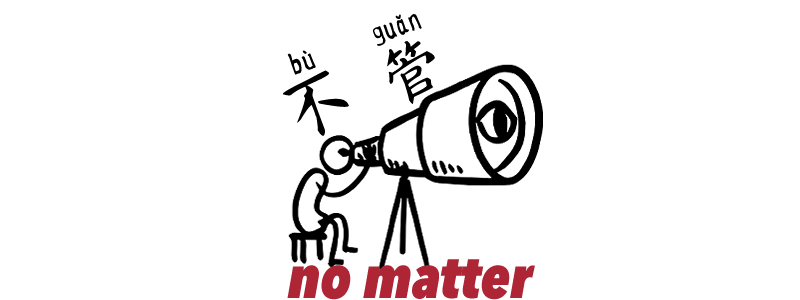Grammar Point:
There are three ways to express “no matter” in Chinese. 不管 bùguǎn, 无论 wúlùn, and 不论 búlùn. 不管 bùguǎn and 不论 búlùn are less formal than 无论 wúlùn.
Structure
Adding Question Word
不管/無論/不論 … +Question word,都…不管/无论/不论 … +Question word,都…
- Question Words:
- 什么 (shénme) what
- 谁 (shéi) who
- 哪 (nǎ) which
- 哪儿 (nǎr) where
- 什么时候 (shénme shíhou) when
- 为什么 (wèi shénme) why ❌
- 怎么 (zěn me) how
- 怎么样 (zěnme yàng) how is it
- 几 (jǐ) how many; how much
- 多少 (duō shǎo) how many; how much
不管/無論/不論天氣怎麼樣,他都會去遛狗不管/无论/不论天气怎么样,他都会去遛狗
No matter what the weather is like, he will walk his dog.
不管/無論/不論你在哪裡,我都會找到你不管/无论/不论你在哪儿,我都会找到你
No matter where you are, I will find you.
不管你打過幾劑疫苗,都還是可能得Covid不管你打过几剂疫苗,都还是可能得Covid
No matter how many doses of the vaccine you have received, you may still get Covid.
無論你說什麼,我都不想聽无论你说什么,我都不想听
I don’t want to hear what you have to say, no matter what.
不論你想去哪裡,我都可以帶你去不论你想去哪儿,我都可以带你去
No matter where you want to go, I can take you there.
Adding A-A
不管/無論/不論 … + A-A,都…不管/无论/不论 … + A-A,都…
* Usually one syllable adjective words*
不管/無論/不論天氣好壞,他都會去遛狗不管/无论/不论天气好坏,他都会去遛狗
No matter what the weather is like, he will walk his dog.
不管/無論/不論你喜不喜歡,你都得接受不管/无论/不论你喜不喜欢,你都得接受
No matter you like it or not, you need to accept it.
不管/無論/不論早晚,他都在讀書不管/无论/不论早晚,他都在读书
No matter what time of day it is, he is studying.
你的頭髮不管長短,都非常好看你的头发不管长短,都非常好看
You look great no matter the length of your hair.
Adding A háishì B
不管/無論/不論 … + A 還是 B,都…不管/无论/不论 … + A 还是 B,都…
不管/無論/不論天氣好還是壞,他都會去遛狗不管/无论/不论天气好还是坏,他都会去遛狗
No matter what the weather is like, he will walk his dog.
不管/無論/不論貧窮還是富有,我都愛她不管/无论/不论贫穷还是富有,我都爱她
It doesn’t matter whether she is poor or rich, I will still love her.
不管單身還是已婚,都應該要活得快樂不管单身还是已婚,都应该要活得快乐
Whether single or married, everyone should live happily.
無論成功還是失敗,都是很好的經驗无论成功还是失败,都是很好的经验
Whether you succeed or fail, it’s a valuable experience.
FYI
Have you ever heard the Chinese idiom “Shībài wéi chénggōng zhī mǔ” (失败为成功之母)? No? Well, it means “failure is the mother of success”. Think of it this way: when you were learning to ride a bike, you might have fallen off a few times, scraped your knees, and felt frustrated. But each time you fell, you learned something new, and eventually, you were able to ride without falling.
That’s the idea behind this idiom. Failure is not the end, but rather a stepping stone to success. So don’t be afraid to speak Chinese and make mistakes. Embrace them, learn from them, and you’ll be on your way to achieving great things! 加油 Jiāyóu!
Adding duō SV
不管/無論/不論 … + 多 SV ,都…不管/无论/不论 … + 多 SV ,都…
不管/無論/不論天氣多冷,他都會去遛狗不管/无论/不论天气多冷,他都会去遛狗
No matter what the weather is like, he will walk his dog.
不管這個東西多貴,他都會買不管这个东西多贵,他都会买
No matter how expensive it is, he is going to buy.
無論你多聰明,學中文都還是需要時間无论你多聪明,学中文都还是需要时间
No matter how smart you are, it still takes time to learn Chinese.
Difference
Do three of these have the same meaning and function?
Based on the character meaning:
不管 bùguǎn means ‘doesn’t matter’ or ‘don’t care’, while 无论 wúlùn and 不论 búlùn mean ‘no discussion’.
不管 bùguǎn is used to convey that the conditions or requirements are not important and will not affect the outcome. 无论 wúlùn and 不论 búlùn, on the other hand, suggest that the outcome will not change regardless of any conditions or requirements.
Therefore, 不管 bùguǎn is usually followed by a negative requirement or condition, while 无论 wúlùn and 不论 búlùn can be used more freely.
Based on the function:
不管 bùguǎn is the most colloquial and commonly used in conversations. On the other hand, 无论 wúlùn and 不论 búlùn are more frequently used in written language.


